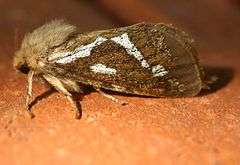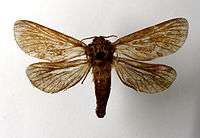Common swift (moth)
| Common swift | |
|---|---|
 | |
| Scientific classification | |
| Kingdom: | Animalia |
| Phylum: | Arthropoda |
| Class: | Insecta |
| Order: | Lepidoptera |
| Family: | Hepialidae |
| Genus: | Korscheltellus |
| Species: | K. lupulina |
| Binomial name | |
| Korscheltellus lupulina (Linnaeus, 1758) | |
| Synonyms | |
| |
The common swift (Korscheltellus lupulina) is a moth of the family Hepialidae. It was previously placed in the genus Hepialus. It is a common, often abundant European species.


The male has a wingspan of about 30 mm with dark brown forewings with white apical and basal streaks meeting to make a 'v' shape with another spot close to the costa. The hindwings are plain brown. The female is larger (wingspan about 40 mm) with similar patterning to the male but generally paler and less distinct. A significant proportion of individuals of both sexes are plain buff or brown with no pattern. The adults fly from May to July and are attracted to light. The species overwinters as a larva.
The larvae feed underground on the roots of a wide variety of plants (see list below) and can be an agricultural pest.
- ^ The flight season refers to the British Isles. This may vary in other parts of the range.
Recorded food plants
- Allium - garlic
- Apium - celery
- Brassica
- Chrysanthemum
- Dahlia
- Daucus - carrot
- Fragaria - strawberry
- Helianthus - Jerusalem artichoke
- Humulus - hop
- Lactuca - lettuce
- Lycopersicon - tomato
- Medicago - alfalfa
- Narcissus - daffodil[1]
- Pastinaca - parsnip
- Phaseolus - bean
- Pisum - pea
- Poaceae - grasses
- Ribes - currant
- Rubus - berries
- Solanum - potato
References
Bibliography
- "Narcissus pests, 6th ed." (PDF). Ministry of Agriculture, Fisheries and Food Bulletin (No. 51). 1970. Retrieved 20 December 2014.
- Chinery, Michael Collins Guide to the Insects of Britain and Western Europe 1986 (Reprinted 1991)
- Skinner, Bernard Colour Identification Guide to Moths of the British Isles 1984
External links
| Wikimedia Commons has media related to Korscheltellus lupulina. |
| Wikispecies has information related to: Hepialus lupulina |